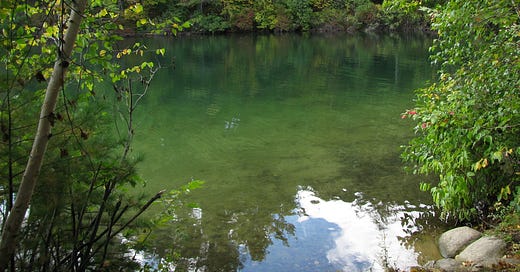
In the winter of 1846, Henry David Thoreau had a mission. While the air still nipped around Walden Pond, the sometimes-hermit clambered out onto the unmelted ice, sixteen inches thick. He planned to pierce the surface and locate what he termed the pond’s “long-lost bottom.”
Many of his predecessors and contemporaries suspected that there wasn’t one to be found. “There have been many stories told about the bottom, or rather no bottom, of this pond,” he wrote in Walden, published eight years later. “Many have believed that Walden reached quite through to the other side of the globe.” Thoreau thought that seemed unlikely. To test his hunch, he wrapped a line around a stone and lowered it down, down, down, until it touched something soft and slimy. He calculated that, at its deepest point, the pond stretched 107 feet from surface to sediment.
But, crucially, he didn’t begrudge anyone their misconception. According to the U.S. Geological Survey, there’s no particular criteria that makes something a pond, as opposed to, say, a lake, though a “pond” is typically smaller; you might be able to glimpse many of its margins in a single glance. To Thoreau, the more humble size didn’t mean fewer mysteries. Part of the magic of a pond is that the water keeps secrets. Standing on the shore, a visitor can imagine fish feasting in the inkiness, or copses of algae, tendrils in tangles. The imagination can somersault precisely because we can’t see exactly what’s going on down there. “What if all ponds were shallow? Would it not react on the minds of men?” Thoreau mused. “While men believe in the infinite, some ponds will be thought to be bottomless.”
“While men believe in the infinite, some ponds will be thought to be bottomless.”
I haven’t written in a few weeks because I’ve stepped out of the city for a while, and in doing so, have waded back into a different kind of relationship with the natural world. It’s not quite right to say that there’s “more” nature here, where I am: Nature is everywhere, anywhere there’s an ant or a petal or a tree. But there are certainly larger patches of land that haven’t been goaded into being something else. In lieu of writing to remind myself about landscapes and to revel in language wielded to honor them, I have roamed them myself. In between vigorous quarantines and repeated COVID-19 tests, I clambered up steep rock faces flanked by wild blueberries; I wound through dusk-darkened woods, listening to owls call to each other from branches high above my head. I looked for fireflies and skies stippled with stars and logs heaped with so much moss they may as well be pillows.
Best of all, I’ve been swimming in any pond I can find. A few weeks ago, in Maine, I floated on my back in cool, placid water the color of bubbleless ale. From that vantage point, belly-up, the trees on shore looked trunkless—just canopies jutting sideways into the robin’s-egg sky. I also swam in Walden. There, I saw darting fish and slick rocks and wondered what was thriving in that deep, wonderful murk. In slightly wild places, imagination feels bottomless.
For me, this week’s poems, “The Peace of Wild Things,” by Wendell Berry, and “The Lake’s Long Hair,” by Freya Manfred, both evoke the idea of a pond as a place of refuge, escape, and excitement—brimming with more than it seems it could hold.
I’d love to know how you’re cooling off, and would gladly fawn over photos of ponds you have met. You can say hello by responding directly to this email; it lands in my regular inbox.
Yours,
Jess
P. S. A few nice links:
If patchwork fields are more your thing, you might like this embroidery of the Devon countryside, stitched by the artist Victoria Rose Richards. The U.S. Department of the Interior recently informed its Instagram followers that it is National Moth Week, and this one is ready to rumble. The Twitter account bringing me the most delight this week is @awhalefact, which doesn’t traffic in actual whale facts so much as (foolproof) pickup lines, including: “Is that a whale in your pants or are you just happy to sea me?” (Use with caution—consent is key in the ocean, too.)
Talk to you soon. Good luck out there.
[Image: Walden Pond, Pablo Sanchez Martin/CC by 2.0]



